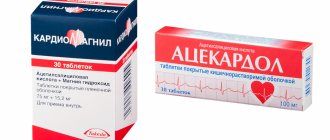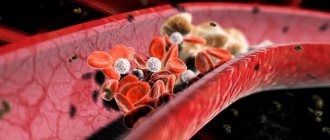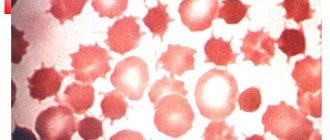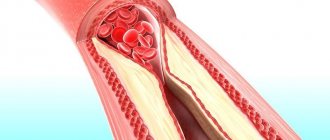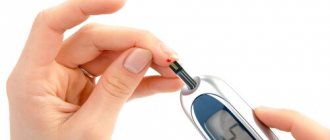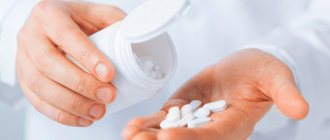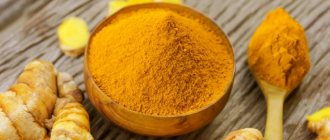Aspirin Cardio is used to prevent pathologies of the heart and blood vessels. It prevents the appearance of thrombotic masses and restores the walls of the vascular bed. The medication is sold in tablet form with a protective coating. This form eliminates irritation of the gastric mucosa and allows you to take the medicine in long courses. Enteric-coated tablets are suitable for patients who have concomitant gastritis or gastric ulcers.
Aspirin Cardio 100 mg
Pharmacodynamics and pharmacokinetics
What is Aspirin?
The active substance of the drug - acetylsalicylic acid (sometimes mistakenly called “acetylic acid”) - belongs to the group of non-steroidal anti-inflammatory drugs , the mechanism of action of which is realized through the irreversible inactivation of the COX enzyme, which plays an important role in the synthesis of thromboxanes and Pg.
Thus, to the question acetylsalicylic acid is aspirin or not, we can confidently answer that Aspirin and acetylsalicylic acid are the same thing.
Natural source of Aspirin: Salix alba (white willow) bark.
Chemical formula of Aspirin: C₉H₈O₄.
Pharmacodynamics
Oral administration of ASA in a dose of 300 mg to 1 g helps relieve pain (including muscle and joint pain) and conditions that are accompanied by mild fever (for example, colds or flu). Similar doses of ASA are prescribed for temperature.
The properties of ASA make it possible to use the drug also in acute and chronic inflammatory diseases . The list of indications for which Aspirin helps includes osteoarthritis , rheumatoid arthritis , and ankylosing spondylitis .
For these diseases, as a rule, higher doses are used than, for example, for fever or colds. To alleviate the condition, an adult, depending on the characteristics of the course of the disease, is prescribed from 4 to 8 g of ASA per day.
By blocking the synthesis of thromboxane A2, ASA inhibits platelet . This makes it advisable to use it for a large number of vascular diseases. The daily dose for this type of pathology varies from 75 to 300 mg.
Pharmacokinetics
After taking an Aspirin tablet, ASA is quickly and completely absorbed from the gastrointestinal tract. During and after absorption, it is biotransformed into salicylic acid (SA), the main, pharmacologically active metabolite .
TSmax ASA - 10-20 minutes, salicylates - from 20 minutes to 2 hours. ASA and SA are completely bound to plasma proteins in the blood and are quickly distributed in the body. SA crosses the placenta and enters breast milk.
in the metabolism of SC. The products of metabolism of the substance are: gentisic, gentisin-uric, salicylic uric acids, as well as salicylacyl and salicylphenol glucuronides.
The kinetics of SA elimination is dose dependent, since metabolism is limited by the activity of liver enzymes . T1/2 is also a dose-dependent value: in the case of low doses, T1/2 is from 2 to 3 hours, in the case of high doses it increases to 15 hours.
SA and its metabolic products are excreted mainly by the kidneys.
Indications for use of Aspirin
Aspirin (ASA) is a symptomatic drug used for conditions involving pain, inflammation and fever.
Indications for use:
- headache;
- toothache;
- algodismenorrhea;
- sore throat caused by a cold;
- muscle and joint pain;
- backache;
- ARVI and colds;
- moderate pain due to inflammation of the joints.
Contraindications for Aspirin
Contraindications are divided into absolute and relative.
Taking the drug is strictly prohibited if you are allergic to ASA or any other non-steroidal anti-inflammatory drugs ( Analgin , Paracetamol , etc.), as well as in conditions that are characterized by an increased tendency to bleeding.
The following contraindications are relative:
- simultaneous use of anticoagulants ;
- deficiency of the cytosolic enzyme G6PD;
- bronchial asthma;
- renal dysfunction;
- chronic diseases of the stomach and duodenum;
- diabetes;
- gout;
- children under 12 years of age;
- pregnancy;
- lactation.
If there are relative contraindications, Aspirin Bayer can be taken only after the doctor approves it.
Special conditions
The medicine should be used carefully in patients with hypersensitivity to painkillers and non-steroidal anti-inflammatory drugs. Prescribe with caution when:
- allergies to the components of the medication;
- ulcerative defects of the digestive tract, intestinal bleeding;
- use of Aspirin Cardio with anticoagulants;
- kidney pathologies, hypovolemia, sepsis, bleeding, congestive heart failure and other pathologies;
- deficiency of glucose-6-phosphate dehydrogenase (acetylsalicylic acid can provoke hemolytic anemia, hemolysis, especially with hyperthermia, acute infectious diseases, high dosages of medication).
- liver failure, hepatitis and other diseases of the biliary system;
- simultaneous use with metamizole and other non-steroidal anti-inflammatory drugs;
- bronchial asthma, hay fever, respiratory diseases, allergopathologies (hay fever, urticaria, and so on) - acetylsalicylic acid provokes bronchospasm.
When prescribing, it should be taken into account that the antiplatelet effect of the drug lasts for 3 days. For this reason, surgery should not be performed until the medication has left the body.
When using small dosages of the medication, accumulation of uric acid is possible. This increases the likelihood of a gout attack in patients who are prone to gout.
Acetylsalicylic acid is not used in children and adolescents during viral diseases that are accompanied by high fever. With hepatitis A, chickenpox, and influenza B, the likelihood of Reye's syndrome is high.
High dosages of the drug can cause bleeding in the digestive tract. Overdose is unacceptable in elderly patients.
Heart attack
Side effects
Side effects:
- hypersensitivity reactions ( skin rashes , bronchospasm );
- decreased platelet in the blood;
- stomach pain.
Frequent and long-term use of ASA in some cases may be accompanied by the development of bleeding from the gastrointestinal tract, the signs of which are:
- tarry stools;
- anemia;
- general weakness;
- persistent abdominal pain.
The appearance of such symptoms requires stopping taking Aspirin and immediately contacting a doctor.
Long-term treatment with high doses of ASA can also provoke:
- damage to the juxtaglomerular apparatus (periglomerular complex) of the kidneys;
- formation of oxalate and/or urate stones in the urinary tract and kidneys;
- renal failure;
- damage to the pancreas insular apparatus;
- disruption of glycogen synthesis (in some cases, even leading to the development of diabetes mellitus );
- thrombocytosis;
- myocardial dystrophy;
- hemolytic anemia, erythrocytopenia, hyperprothrombinemia, neutrophilic leukocytosis;
- decreased capillary permeability (possibly increased blood pressure and deterioration of tissue trophism);
- hemolysis of erythrocytes (in patients with G6PD deficiency);
- violation of copper and zinc metabolism;
- dysbacteriosis of the oral cavity.
Aspirin tablets, instructions for use
The instructions for use of Aspirin indicate that the tablets should be taken orally after meals with a sufficient amount of liquid.
The maximum duration of treatment with the drug without consulting a doctor is 5 days.
As a single dose, adults are prescribed from 300 mg to 1 g of ASA. Repeated use is possible after 4-8 hours. The permissible upper limit of the daily dose is 4 g.
Aspirin: how to drink to prevent heart and vascular diseases?
A systematic review of various studies showed that the use of Aspirin after myocardial infarction can reduce the incidence of non-fatal heart attacks , the incidence of non-fatal strokes of recurrent strokes and heart attacks by 25% , and vascular death by 15%.
Moreover, the positive effect of ASA does not depend on gender, age, the presence of diabetes mellitus and blood pressure .
Studies have found that after myocardial infarction, ASA should be prescribed immediately, and treatment should continue until specific contraindications are identified. The optimal dosage for vascular prevention is 160-325 mg/day.
What to take with Aspirin?
It is recommended to drink Aspirin tablets with milk, jelly or sodium bicarbonate mineral water.
Aspirin for blood thinning: does ASA thin the blood?
ASA is a disaggregant . This property of the drug allows it to be used in conditions where it is necessary to create obstacles to induced or spontaneous platelet .
There are 2 groups of blood thinning drugs: without ASA and based on this substance. Blood thinners without ASA are anticoagulants . Medicines based on ASA belong to the group of antiplatelet agents .
When asked whether Aspirin thins the blood or not, doctors answer that the point of the effect of antiplatelet agents (and, in particular, ASA) is that they reduce the ability of platelets to stick together, and this in turn reduces the risk of blood clots .
What is Aspirin used for? The instructions and Wikipedia provide the following recommendations in this regard: the drug should be prescribed to patients with high cardiovascular risk, people who have had a myocardial infarction , as well as during the acute period of ischemic stroke , circulatory disorders in the brain and other manifestations of atherosclerosis .
Elena Malysheva says the following about the drug: “A cure for old age. There are no blood clots in the vessels, good blood flow in the brain, heart, legs, arms. In leather! She also notes that the product reduces the risk of atherosclerosis and protects the body from cancer.
Tips on how to take Aspirin for blood thinning correctly are as follows: the optimal dose of the drug when used to prevent vascular complications is a dose of 75-100 mg/day. This is the dose that is considered the most well balanced in terms of safety/efficacy.
Western doctors do not practice using Aspirin to thin the blood, however, in Russia it is recommended quite often for these purposes. Knowing the benefits of ASA for blood vessels, some people begin to take the drug uncontrollably.
Doctors never tire of reminding you that before taking Aspirin to cleanse the vascular walls of cholesterol and “soften” the blood, you must obtain a doctor’s approval.
How is Aspirin harmful? Studies conducted by scientists in the 70s of the 20th century showed that ASA drugs affect blood viscosity, thereby helping to reduce the load on the heart muscle and preventing an increase in blood pressure.
However, to achieve these effects, 50-75 mg of the substance per day is usually sufficient. Regularly exceeding the recommended preventive dose can give exactly the opposite results and cause harm to the body.
In other words, taking ASA to thin the blood, if there are no signs of heart disease, has a negative effect on the body.
How to replace ASA?
Patients often wonder what thins the blood other than Aspirin. As an alternative to medications, you can use individual blood thinning products - analogues of antiplatelet agents .
The main ones are those containing salicylic acid , vitamin E and iodine . Herbal substitutes for Aspirin include licorice, sage, aloe, and horse chestnut. Also, to thin the blood, it is good to include cherries, oranges, cranberries, raisins, grapes, tangerines, blueberries, thyme, mint, ginger and curry in your diet.
Meat, fish and dairy products do not thin the blood, but regular consumption of fish helps improve the blood count. becomes less viscous when the body receives a sufficient amount of vitamin D.
Pregnant women are recommended to thin their blood with eggplants, zucchini, cabbage, onions, horseradish, capsicums, lemons, pomegranates, currants, cranberries, and viburnum.
Does Aspirin Lower or Increase Blood Pressure? Aspirin for headaches
Aspirin for headaches is especially effective if the pain is caused by increased intracranial pressure (ICP). This is due to the fact that ASA has a blood-thinning effect and thus helps reduce ICP.
For headaches (depending on its intensity), adults are usually prescribed to take from 0.25 to 1 g of ASA every 6-8 hours.
How to take Aspirin for varicose veins for prevention?
The action of ASA is aimed at suppressing platelet . As a result, for varicose veins regular use of the drug helps reduce the risk of thrombosis .
However, doctors answer the question “Can I take Aspirin every day?” They answer that it is still not worth varicose veins The optimal way to use the product is with special medicinal compresses.
To prepare a compress, it is recommended to pour 200 ml of alcohol (vodka) into crushed Aspirin tablets (10 pieces) and leave the medicine for 48 hours. Compresses are applied to the area of dilated veins daily, at night. This procedure for varicose veins helps eliminate pain.
How is Aspirin useful in cosmetology?
In cosmetology, ASA is used for hair (in particular, as a remedy for dandruff), to treat acne and improve skin. The effectiveness of the product is confirmed by a large number of positive reviews and pictures in which you can evaluate the appearance of the face before and after using Aspirin.
For facial skin, ASA is used in creams for daily care, as well as in masks. The benefit of this treatment for the face is that inflammation and redness disappear from the skin quite quickly - within a few hours - and tissue swelling subsides.
In addition, face masks with Aspirin help exfoliate the layer of dead cells and cleanse the pores of subcutaneous sebum.
When asked how Aspirin helps with acne on the face , cosmetologists answer that the ability to cleanse pores is due to its drying effect and good solubility in fats, thanks to which ASA can penetrate deep enough into pores clogged with sebum.
Light peeling is guaranteed due to the granular structure of the dissolved drug. At the same time, the product does not injure healthy areas of the skin. This is due to the fact that ASA works somewhat differently than abrasive scrubs, the exfoliating effect of which is realized due to the presence of coarse particles in their composition.
The action of ASA, unlike such agents, is aimed at weakening the adhesive bonds between cells, which in turn helps remove dead cells from the surface of the skin without damaging young healthy cells in the deeper layers.
The simplest recipe against acne is to put half a tablet of the drug on the inflamed area.
You can also add crushed Aspirin tablets to the cream. To prepare the composition, 4 tablets of the drug are placed in a bowl and water is dripped onto them. When the medicine begins to dissolve, rub it with your fingers to a pasty consistency and then mix it with 2 tbsp using a spatula. spoons of cream.
To make the acne remedy have a finer texture, you can add up to 1 tbsp to the mixture. spoons of warm water. The cream is applied to the face and washed off after 15 minutes with warm water.
Aspirin for acne can also be used in combination with freshly squeezed lemon juice.
The recipe for such an anti-acne Aspirin mask is simple: 6 tablets of the drug are ground with lemon juice until a homogeneous mass is obtained (reviews suggest that the process of dissolving the tablets can take 10 minutes), and then the resulting paste is applied pointwise to the pimples and left to dry.
It is recommended to remove the paste from the skin with a solution of baking soda to neutralize the acid.
There are also good reviews about the face mask with Aspirin and honey. To prepare the medicinal composition, you need to place 3 tablets in a bowl (not effervescent Aspirin UPSA is used, but regular tablets) and drop water on them. When the tablets become loose, add 0.5-1 teaspoon of honey to them and mix thoroughly.
If the honey is too thick, you can add a few drops of water to the mixture. The mask is applied to dry skin for 15 minutes, and then gently, in a circular motion, wash your face with warm water.
A mask made of honey and Aspirin is most suitable for aging, oily and porous skin, but cosmetologists say that you can use such a mask with honey for acne.
A good anti-acne mask with Aspirin and clay. To prepare it, you need to take 6 ASA tablets, 2 teaspoons of cosmetic clay (blue or white) and a small amount of warm water.
All ingredients are stirred in a convenient container until a paste is obtained, after which the composition is applied to the face with a cotton pad for 15 minutes. If unpleasant sensations (burning, itching) occur, the mask can be washed off earlier. After the procedure, it is recommended to wipe the skin with a sponge soaked in a decoction of chamomile or chamomile.
To eliminate small acne and blackheads, Aspirin is used in combination with carbonated mineral water and black cosmetic clay. For 1 tbsp. a spoonful of clay you need to take 1 tablet of ASA. First, the clay is diluted with mineral water, then Aspirin is added to the resulting slurry.
The composition is applied to the skin in a thin layer. Exposure time is 20 minutes. After the procedure, it is recommended to apply the cream no earlier than 10-15 minutes (this will allow the skin to “breathe”).
Levomycetin , calendula and Aspirin in the form of a talker are effective against acne To prepare the product, add 4 tablets of each drug to 40 ml of calendula tincture and shake the bottle well. The solution is used to wipe the face.
Facial cleansing with Aspirin is carried out using only tablets in their pure form. It should be remembered that there are different types of ASA on sale. However, tablets without additional coating should be used for peeling; coated aspirin is not used for these purposes.
The soaked tablet of the drug is placed on a cotton pad, and then applied to the skin of the face in a circular motion for 3 minutes and then washed off with warm water.
For blackheads, against pimples (comedones) and to prevent the appearance of acne, you can use Aspirin as part of a mask with coffee and clay. At 2 tbsp. spoons of white or blue cosmetic clay, it is recommended to use 1 teaspoon of natural medium-ground coffee and 4 ASA tablets.
Carbonated mineral water is poured into the finished mixture in small portions in the amount necessary to obtain a thick slurry. The product is applied to the skin with slow massaging movements, covering all areas except the area of the upper and lower eyelids. Exposure time is 20 minutes, after which the mask is washed off. To enhance the effect, problem areas can be wiped with an ice cube.
Aspirin for hair is used mainly as a remedy for dandruff. The easiest way to treat hair diseases is to use shampoo with ASA.
To prepare the healing composition, measure out the amount of shampoo required for one hair wash into a separate container (it is better if it contains a minimum of dyes and fragrances), and then add 2 crushed ASA tablets (uncoated) to it.
Aspirin Cardio and Cardiomagnyl: what is the difference?
Aspirin Cardio contains only acetylsalicylic acid. Cardiomagnyl differs from Aspirin Cardio in an additional component. In addition to acetylsalicylic acid, the medicine also contains magnesium hydroxide. This micronutrient is necessary to protect the gastric mucosa.
Aspirin Cardio is an inexpensive but effective antiplatelet drug. It is actively used to prevent heart and vascular diseases. You should take the medicine only as recommended by your doctor. The effect is achieved with long-term and continuous treatment.
Cardiomagnyl, 75 mg+15.2 mg, film-coated tablets, 100 pcs.
Takeda, Germany
Price from 183₽
Cardiomagnyl, 150 mg+30.39 mg, film-coated tablets, 30 pcs.
Takeda, Germany
Price from 146₽
Cardiomagnyl, 150 mg+30.39 mg, film-coated tablets, 100 pcs.
Takeda, Germany
Price from 351₽
There are contraindications. Specialist consultation is required.
Overdose
Symptoms of a moderate overdose are: tinnitus, nausea, hearing loss, vomiting, confusion, dizziness, headache. These phenomena disappear when the dose of the drug is reduced.
Severe overdose of Aspirin is accompanied by hyperventilation, fever, metabolic acidosis , respiratory alkalosis , ketosis , cardiogenic shock , coma , severe hypoglycemia , and respiratory failure .
In such cases, the patient is hospitalized. Treatment includes the use of activated carbon , lavage, control of acid-correct reaction, forced alkaline diuresis to obtain urine pH values within 7.5-8.0, compensation for fluid loss, hemodialysis, and symptomatic therapy.
Interaction
ASA enhances the effects of non-steroidal anti-inflammatory drugs (for this reason, doctors do not recommend taking Aspirin with other drugs in this group, for example, simultaneously with Paracetamol ), non-narcotic analgesics , oral hypoglycemic drugs , indirect anticoagulants , Heparin , thrombolytics that suppress platelet aggregation, triiodothyronine , sulfonamides .
Reduces the effects of diuretics , uricosuric drugs , antihypertensive drugs .
GCS, alcohol and drugs containing ethanol enhance the damaging effect of ASA on the mucous membrane of the digestive canal, increasing the risk of developing gastric and intestinal bleeding.
ASA increases the plasma concentration of Li drugs, barbiturates and digoxin .
Absorption of ASA worsens and slows down when taking the drug simultaneously with antacids containing Al and/or Mg hydroxide.
special instructions
ASA can cause hypersensitivity reactions (for example, an attack of bronchial asthma (BA) or bronchospasm ). Risk factors are a history of asthma, nasal polyps, fever, chronic bronchopulmonary diseases, cases of allergies (skin manifestations of allergies , allergic rhinitis ).
ASA can increase the tendency to bleeding, which is due to its inhibitory effect on platelet . This must be taken into account when prescribing the drug to patients who are undergoing surgery (including minor surgery, such as tooth extraction).
The drug is stopped 5-7 days before surgery. The physician should be informed that the patient was taking Aspirin before surgery.
of gout in predisposed patients .
Aspirin - benefit or harm?
ASA is widely used as an analgesic , antipyretic and anti-inflammatory agent . In lower doses it is used to prevent the development of vascular complications.
Today, ASA is the only disaggregant whose effectiveness when used in the acute period of ischemic stroke (cerebral infarction) is supported by evidence-based medicine.
of colorectal cancer , as well as prostate , lung , esophagus and throat is significantly reduced .
An important feature of ASA is that it irreversibly inhibits COX, an enzyme that is involved in the synthesis of thromboxanes and Pg. Acting as an acetylating agent, ASA attaches an acetyl group to the serine residue in the active site of COX. This distinguishes the drug from other NSAIDs (in particular, ibuprofen and diclofenac), which belong to the group of reversible COX inhibitors.
Bodybuilders use the combination “Aspirin-Caffeine- Broncholithin ” as a fat burner (this mixture is considered the progenitor of all fat burners). Housewives have also found use of ASA in everyday life: the product is often used to remove sweat stains from white clothes and to water fungus-affected soil.
You can also use ASA for flowers: a crushed Aspirin tablet is added to water when you want to preserve cut plants longer.
Some women use Aspirin tablets as a contraceptive: the tablet is administered intravaginally 10-15 minutes before PA or dissolved in water and then douched with the resulting solution.
The effectiveness of this method of birth control has not been studied, however, gynecologists do not deny the right to its existence. At the same time, doctors note that the effectiveness of contraception using ASA is only about 10%.
There is also an opinion that using Aspirin can terminate a pregnancy. Doctors, of course, do not welcome such methods, but advise that if pregnancy is not planned and unwanted, you should still seek help from medical institutions in a timely manner.
Despite the large number of beneficial properties, the drug also has a bad reputation. Suppression of COX activity provokes a violation of the integrity of the walls of the digestive canal and is a factor in the development of peptic ulcers .
ASA can also be dangerous for children under 12 years of age. If used when a child has a viral infection, the drug can cause Reye's syndrome , a disease that poses a threat to the life of young patients.
Aspirin analogues
Level 4 ATC code matches:
Acetylsalicylic acid
Aspirin-S
Citropak
Citramon
Coficil-Plus
Farmadol
Askofen-P
Cefekon N
Aquacitramon
Upsarin UPSA
Citrapack
Alca Prim
Thrombopol
Citrapar
Structural analogues: Acetylsalicylic acid , Aspirin UPSA , Thrombo Ass , Taspir , Fluspirin , Asprovit , Aspirin “York” (or “American aspirin” is another name for this drug).
What can replace Aspirin?
Analogs with a similar mechanism of action: Aspirin Complex s, Askofen-P , Citrapar , Sodium salicylate , Cofitil-Plus , Asprovit-S , Aspagel , Alka-Prim , AnGricaps , Tsefekon N.
Which is better: Aspirin or Aspirin Cardio?
When asked what is the difference between Aspirin and Aspirin Cardio, doctors answer that the differences between the drugs are the dosage of the active substance (lower in Aspirin Cardio) and the fact that Aspirin Cardio tablets are produced in a special enteric coating, which protects the mucous membrane of the digestive canal from the aggressive action of ASA.
Aspirin and Aspirin Cardio have different indications for use. The first (it contains 500 mg of ASA) is used as an analgesic , antipyretic and anti-inflammatory agent . Aspirin Cardio, the concentration of ASA in which is 100 or 300 mg/tablet, is prescribed for the prevention and treatment of:
- thrombosis and embolism after CABG, transdermal intravascular coronary angioplasty and other vascular operations;
- myocardial infarction;
- unstable angina ;
- passing disturbances of blood flow in the brain and stroke at the premorbid stage;
- coronary artery thrombosis in patients at risk;
- migraine (including for long-term prevention).
What is it used for?
Aspirin Cardio is used to thin the blood. This is a non-steroidal anti-inflammatory drug that has a pronounced antiplatelet effect. The drug is used to prevent pathologies of the heart and vascular bed, thrombosis.
Indications for use of the product:
- Angina attacks;
- Prevention of subsequent attacks of myocardial infarction;
- Prevention of hypoxic brain damage;
- The recovery period after vascular surgery, when the risk of thrombosis is quite high (coronary artery bypass grafting, angioplasty and others).
The drug is prescribed by a cardiologist after a complete examination of the patient.
Can children be given Aspirin?
It is recommended to give Aspirin to children from the age of 12.
It is prohibited to give drugs containing ASA to children with a fever that rises due to a viral infection
Thus, the combination of Aspirin and a viral infection can cause the development of Reye 's syndrome, a disease that affects the brain and liver and from which approximately one in five young patients die.
The risk of developing Reye's syndrome increases in cases where ASA is used as a concomitant drug, but there is no evidence of a cause-and-effect relationship in such cases. One of the signs of Reye's syndrome is prolonged vomiting.
As a single dose, children under three years old are usually given 100 mg, children four to six years old - 200 mg, and children seven to nine years old - 300 mg ASA.
The recommended dose for a child is 60 mg/kg/day, divided into 4-6 doses, or 15 mg/kg every 6 hours or 10 mg/kg every 4 hours. The drug in this dosage form is not used in children under three years of age.
Dosage Forms
The medication is available in tablet form. The tablets have a special protective coating that is not subject to dissolution in the acidic environment of the stomach. The shell of the tablet form dissolves only in the cavity of the duodenum. This form allows you to prevent damage to the gastric mucosa during long-term use. The medicine is also suitable for patients with concomitant diseases of the digestive tract.
Dosages of tablets can be as follows:
- 100 mg,
- 300 mg.
People often wonder who the manufacturer of Aspirin Cardio is. The medicine is produced by Bayer (Germany).
Asirin Cardio tablets
Alcohol compatibility
Can I take Aspirin with alcohol?
Aspirin and alcohol are incompatible. There are descriptions of cases where taking even 40 g of alcohol in combination with the drug was accompanied by the development of gastric bleeding and severe allergic reactions.
Does Aspirin help with hangovers?
Aspirin for a hangover is very effective due to the ability of ASA to prevent platelet (both spontaneous and induced).
When asked whether it is possible to drink Aspirin with a hangover, doctors answer that it is better to take the drug not after alcohol, but about 2 hours before the planned feast. This will prevent microthrombi in the small blood vessels of the brain and, to some extent, tissue swelling.
When you have a hangover, it is best to take quickly dissolving Aspirin, for example, Upsarin UPSA . The latter is less irritating to the gastrointestinal mucosa, and the citric acid it contains activates the processing of under-oxidized alcohol breakdown products. The optimal dosage is 500 mg for every 35 kg of body weight.
Aspirin during pregnancy
Is it possible to take Aspirin during early pregnancy?
Use of salicylates in the first three months has been associated with an increased risk of birth defects (including heart defects and cleft palate) in selected retrospective epidemiological studies.
However, with long-term use of the drug in therapeutic doses that do not exceed 150 mg/day, this risk turned out to be low. In 32 thousand mother-child pairs, studies revealed no connection between the use of Aspirin and an increase in the number of congenital malformations.
During pregnancy, ASA should be taken only after assessing the risk to the child/benefit ratio for the mother. If long-term use of Aspirin is necessary, the daily dose of ASA should not exceed 150 mg.
Aspirin for pregnant women in the 3rd trimester
In the last months of pregnancy, taking high (more than 300 mg/day) doses of salicylates can cause post-term pregnancy and weakening of contractions during childbirth.
In addition, treatment with Aspirin in such doses can lead to premature closure of the child's ductus arteriosus (cardiopulmonary toxicity).
The use of high doses of ASA shortly before birth can provoke intracranial bleeding, especially in premature infants.
Based on this, except for exceptional cases caused by obstetric and cardiological medical indications using special monitoring, the use of ASA in the last trimester of pregnancy is contraindicated.
Is it possible to take Aspirin while breastfeeding?
Salicylates and their metabolic products penetrate into milk in small quantities. Since no side effects have been reported in infants after accidental use of the drug, it is usually not necessary to interrupt breastfeeding.
If long-term treatment with the drug in high doses is necessary, it is necessary to decide on stopping breastfeeding.
Is it allowed for pregnant and breastfeeding women?
According to studies, drugs related to inhibitors of prostaglandin production provoke miscarriages and embryonic malformations. No such effects have been observed when using salicylic acid in pregnant women. The drug is still not indicated in the first trimester, since during this period all organs and systems are formed.
In the 2nd trimester of pregnancy, the medication can be used if the benefit to the woman outweighs the possible risks to the embryo. The dosage of the drug and the duration of course therapy should be minimal.
In the 3rd trimester of pregnancy, the medicine can reduce labor, which can be dangerous for the mother and the embryo. The medication also reduces the blood's ability to clot. This can lead to heavy bleeding during childbirth. Consequences in the fetus when using Aspirin in the 3rd trimester:
- Cardiopulmonary intoxication, early closure of the ductus arteriosus, pulmonary hypertension;
- Insufficient kidney function.
For these reasons, the medication should not be used on the eve of obstetrics.
Salicylic acid can enter milk secretions and affect the baby's body. If the medication was prescribed for maternal health reasons, breastfeeding should be stopped. To maintain lactation function, a woman needs to pump regularly. At the end of the course of therapy, breastfeeding can be resumed.
Reviews of Aspirin
Aspirin is a medicine familiar to everyone. Its effectiveness has been clinically tested, and its safety profile and mechanism of action have been thoroughly studied. WHO included ASA in the list of essential drugs.
The properties of ASA make it possible to use Aspirin to relieve pain and inflammation, to reduce elevated temperature and ICP, as well as to prevent vascular complications.
Along with reviews of the use of ASA for its intended purpose, women also leave good reviews of facial cleansing with Aspirin and reviews of the use of the drug for hair. There are also many positive reviews about the “Aspirin with Honey” mask, which is used in cosmetology as a remedy for acne.
Aspirin treats inflamed elements well, relieves tissue swelling and promotes exfoliation of dead cells; honey is useful for facial skin because, penetrating into the deep layers, it perfectly nourishes and cleanses the skin, prevents the evaporation of moisture from the skin, and has an astringent, tightening and toning effect.
Sources
- ON THE. Belolipetsky, S.N. Tolpygina, O.A. Litinskaya, V.G. Belolipetskaya, S.Yu. Martsevich // Disaggregant effectiveness and tolerability of the original drug “Aspirin Cardio” and its generic “Acecardol” in patients with arterial hypertension of 1-2 degrees // Rational Pharmacotherapy in Cardiology // 2008.
- V.B. Mychka // Features of antiplatelet therapy in women // Journal of Cardiology and Angiology // 2011
- I. V. Samorodskaya // Current issues in the use of acetylsalicylic acid for the purpose of primary prevention of cardiovascular events // “Attending Physician” magazine // 2014
Aspirin Cardio
Aspirin price, how much tablets cost
The price of Aspirin 500 mg No. 10 in Russia is 225 rubles. Price of Aspirin Cardio 300 mg No. 20 - from 80 rubles, 100 mg No. 28 - from 130 rubles. You can buy effervescent Aspirin Bayer for an average of 200 rubles. (price for 10 tablets), Upsarin UPSA - from 170 rubles. for 16 tablets.
The cost of the drug Thrombo Ass is from 45 rubles.
- Online pharmacies in RussiaRussia
- Online pharmacies in UkraineUkraine
- Online pharmacies in KazakhstanKazakhstan
LuxPharma* special offer
- Agrenox, analogue (Arreno) (Acetylsalic acid - Aspirin plus Dipyridamole) capsules No. 30
RUR 1,470 order
ZdravCity
- Aspirin cardio tab. p/o ksh/sol. 100mg 98pcs Bayer Bitterfeld GmbH
RUB 328 order
- Aspirin with spike tablets. 10 pcs. Bayer Bitterfeld GmbH
RUB 281 order
- Aspirin Cardio tablets p.p.o. intestinal 100 mg 28 pcs. Bayer AG/Bayer Bitterfeld GmbH
93 RUR order
- Aspirin complex por. thorn. n10Kern Pharma SL
RUR 497 order
Pharmacy Dialogue
- Aspirin Bayer effervescent tablets No. 10 with vitamin C Bayer
RUB 294 order
- Aspirin Cardio tablets 100 mg No. 28Bayer
88 rub. order
- Aspirin Cardio (tablet p/o 300 mg No. 20) Bayer
93 RUR order
- Aspirin Express (tab. spike. 500 mg No. 12) Bayer Bitterfeld GmbH
RUB 277 order
show more
Pharmacy24
- Aspirin C No. 10 effervescent tablets Bayer Bitterfeld GmbH, Nimechchina
68 UAH. order - Aspirin Cardio 100 mg No. 56 tablets Bayer Pharma AG, Nimecchina / Bayer Bitterfeld GmbH, Nimecchina
93 UAH order
- Acetylsalicylic acid (Aspirin) 500 mg No. 10 tablets PAT "Kievmedpreparat", Ukraine/PAT "Galichfarm", Ukraine
7 UAH order
- Acetylsalicylic acid (Aspirin) 500 mg No. 10 tablets PAT "Lubnipharm", Ukraine
3 UAH order
- Aspirin 500 mg N10 tablets Bayer Bitterfeld GmbH, Nimechchina
39 UAH order
PaniPharmacy
- Aspirin cardio tablets Aspirin cardio tablets 300 mg No. 28 Germany, Bayer Bitterfeld
92 UAH order
- Aspirin tablets Aspirin tablets 500 mg No. 10 Germany, Bayer Bitterfeld
41 UAH order
- Aspirin cardio tablets Aspirin cardio tablets 100 mg No. 28 Germany, Bayer Bitterfeld
61 UAH order
- Aspirin tablets Aspirin tablets. 500 mg No. 20 Germany, Bayer Bitterfeld
73 UAH order
- Aspirin cardio tablets Aspirin cardio tablets 100 mg No. 56 Germany, Bayer Bitterfeld
99 UAH order
show more
Similar medications
Aspirin Cardio has its own analogues. The following similar drugs are distinguished:
- Acetylsalicylic acid - the drug has the same active substance, is produced in tablets, but without a shell;
- Thrombo ACC - contains the same active ingredient, is available in tablet forms with an enteric coating;
- Acecardol - has a similar shape and composition;
- ASK-Cardio - produced in tablets with a protective coating.
Thrombo ACC, 50 mg, enteric film-coated tablets, 100 pcs.
Bausch Health, Austria
Price from 96₽
Acecardol, 50 mg, enteric-coated tablets, 30 pcs.
Sintez, Russia
Price from 20₽
ASK-cardio, 100 mg, enteric-coated tablets, 30 pcs.
Medisorb, Russia
Price from 55₽
There are contraindications. Specialist consultation is required.
